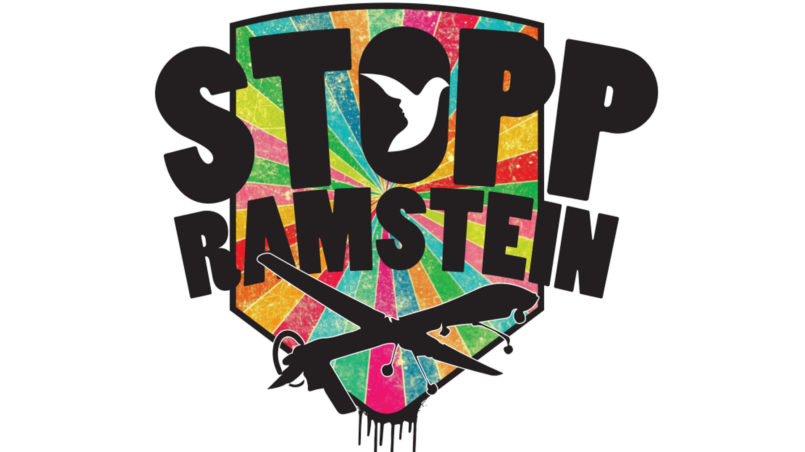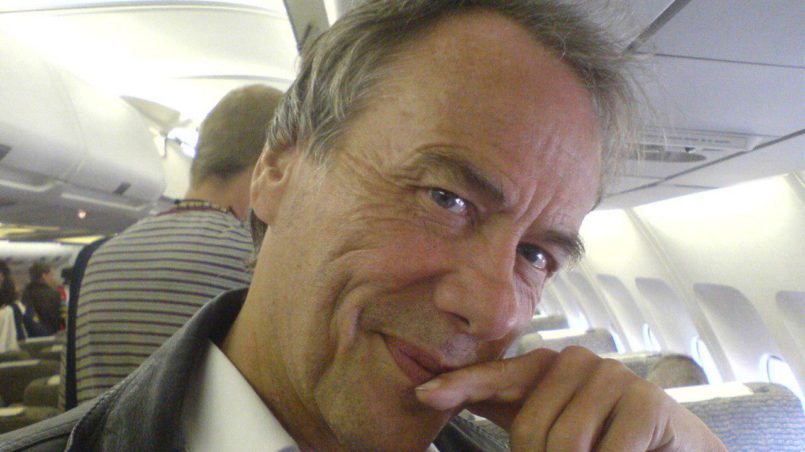“Everything is unthinkable without peace.” An interview with Reiner Braun

If, at the end of the ’90s, one had the impression of moving into a peaceful, international new millennium, 17 years after the celebrations, a sober analysis has to be faced.
The Middle East is sinking into bloody chaos and war driven by foreign interests, Europe is forced to face the associated refugee crisis, and is also threatened by a desperate and brutal terror, which has grown from and is nurtured by these wars.
For “Idealism Prevails”, Stephan Bartunek embarked on a search for a person who has kept calm in the storm of this time and who has been dealing with wars, but also with solutions for peace, for decades.
Reiner Braun, born in 1952, is a journalist and the managing director of Berlin-based IALANA (Lawyers against Nuclear, Biological and Chemical Weapons – For Non-violent Peacebuilding – German Section of the International Association of Lawyers Against Nuclear Arms). Since 2013 he has also been co-president of the International Peace Bureau in Geneva. Reiner Braun lives and works in Berlin.
Mr. Braun, you have been active in the peace movement for a long time and you have extensively dealt with issues in this area. The term “peace” (the German word is pronounced “freeden” – translator’s note) sounds very beautiful, its phonetics alone resonate in a very relaxing way. Yet, the word can be very abstract.
What is peace, really? Is it just the absence of war or does it go beyond that?
In many war situations, e.g. in Syria or Afghanistan, an absence of war is a survival signal for the people, the killing on a daily basis has ceased. However, the absence of war is certainly not the same as peace. For me, analogous to the ideas of the great old Norwegian peace researcher, Johan Galtung, peace means overcoming structural violence, i.e. overcoming internal and external structures of violence, and includes the need for social and global justice as well as peace with nature.
I do not have to stress that a comprehensive disarmament process and the abolition of nuclear weapons are components of such a definition of peace.
Given the current authoritarian developments in many countries, I would like to emphasise that democracy and participation are inseparable components of such a “global peace”. We will certainly achieve this step by step, and the absence of war, as well as measures of civilian conflict management, can be a starting point.
You became interested and involved in peace politics and related movements at a very young age.
How did you, as a young person, become so committed to peace?
I come from the student movement where I was active and, at the end of the ’70s until the beginning of the ’80s of the last century, was confronted with an immensely growing danger of the nuclear threat, especially by the stationing of new American first-strike weapons in Europe. I took part in organising the protest against this at the University and consequently worked for the Krefeld Appeal for many years, where I could also actively participate in the development of professional peace initiatives, such as that of the natural scientists. The Krefelder appeal, which was ultimately signed by more than 5 million people, is to this day the most historically significant petition in Germany and was an essential crystallization point for the peace movement of the ’80s.
Concern for the future brought me to the peace movement, as it did hundreds of thousands, even millions of other young people at that time.
In your active time, you got to meet some very prominent people. Among others, Petra Kelly, founding member of the Greens in Germany in 1980. At that time, the Greens were a party that actively campaigned for peace.
How do you see the development of the Greens throughout Europe as a whole and specifically in Germany when you reflect on the past 35 years?
When I think about it, I get the creeps. Or politically speaking:
I see how strongly the prevailing integrating effects functionin the system. A pacifist party becomes a war party, which today has thrown anti-militarism and a NATO-critical position overboard in favour of participation in governments.
We should always keep an eye on how quickly this happens, with other parties also. With the SPD it took historically longer. But their betrayal of peace, among other factors, made World War I possible.
Only a strong independent peace movement can prevent party tactics and power gain from becoming more important than peace.
This makes the rejection of war position of “the left-wing” in the German Bundestag all the more important in my view, but also the ever-extended hand to every Social Democrat and Greens, but also to conservatives who want to become active with us against war and for disarmament.
A tough endurance test for the institutionalised left and its remains in the Social Democratic and Green political parties was the coup and subsequent civil war in Ukraine. Thanks to a broad closing of ranks in the opinion of large newspapers, it was quickly clear that anyone who opposes NATO has to be a friend of Putin.
Are you also one of these “Putin sympathisers”?
The greatest burden, at least for Germany in relation to the SPD and the Greens, was the participation of the “red-green” federal government in the Yugoslav war of 1999, contrary to international law. At that point a line was crossed. The further intervention wars were more or less a logical consequence of the shift of the SPD and Greens to the “war camp”.
Of course, we must understand Putin. Only when I analyze the politics of my “counterpart” or partner can I react correctly – in the sense of peace. A policy of common security with Russia (I am against personalisation) is based on the fact that I understand Russian politics, look for similarities and research, accept the interests of the other side as just as legitimate as my own, and build a policy of commonality, and continue to discuss controversy in a rational manner.
This was Willy Brandt’s policy of détente (also that of Bruno Kreisky and Olof Palme), and I am also somewhat influenced by him.
Peace in Europe is never possible against, but only with Russia. Exactly because I say this and stand up for it, I can also criticise the Putin system. For me as a socialist, I can never fraternise with an undemocratic oligarch. Human rights and civil rights have a different value for me, but let me say it once again clearly: criticism on the top of rockets and guns does not work, a critical dialogue is only possible and useful in an atmosphere of a policy of détente.
The old peace movement seemed to have overlooked the crisis in the Ukraine, and was surprised by a new peace movement, which had grown out of the Monday vigils for peace.
How did you experience this movement?
Overlooked is certainly not correct, but the response was not sufficiently action-oriented. All the more impressive that tens of thousands – mostly young – people took to the streets. I not only observed this, but went and talked there, discussing a lot. Differences in content, which certainly do and will exist, notwithstanding, I saw and heard many more similarities than political differences .
I helped everywhere to push out right-wing forces, or to raise awareness of them. Right-wing radicalism and peace is like fire and water.
Right-wing extremist positions rely on violence (outwardly and against minorities) and have a tactical relationship with peace. This is not the position of the peace movement. To me, there is no such thing as an old and a new peace movement.
The peace movement is all of us who commit to peace, who are against violence, for disarmament and civilian conflict management. A classification in old and new boxes benefits nobody, but helps only those who want to split us, and those who do not want a peace movement or a weak peace movement.
Within the old peace movement, there have been, and there are still, debates that the new peace movement is “rechtsoffen” (open to right-wing influences – translator’s note). This perception was also intensified with the help of parts of the mainstream media and, above all, distorted.
Perhaps a naive question, which springs to mind, but is an honest desire for a peaceful society, a peaceful world readily available only to people who do not represent right wing political positions?
‘Rechtsoffen’ is a combat concept for defamation. Anyone who is serious about this will see that for a left wing thinker, almost everything is open to right wing influences and yet these people are allies. For a Social Democrat, a liberal or conservative is ‘rechtsoffen’ – is this a reason not to work with them for peace?
Right-wing radical, now that is something different: such a person has learned no lessons from the past. There is only a clear ‘no-go’ for right-radical, or even fascist positions. Fascism is not an opinion, but a crime. This theorem holds unconditionally.
That is why we also demonstrated against the Trumpism in the USA and worldwide on 20th January. Right-wing extremist positions, often downplayingly referred to as right-wing populist, must be pushed back if we want to defend our liberties, democracy and social rights. In a peaceful and just world there will surely be many different humanistic but no longer radical positions, because they would be deprived of its social base for deepest disappointment over capitalism as well as violence and aggression. This is what I am doing, and this is the dream of global justice that will become reality if this planet is not to sink into social and ecological chaos.
War in itself is rather right-wing. It is legitimised by law and the related state apparatus. The counterpart, terror itself, tends to go in a left-wing extremist direction. If one concedes that a “left” is committed to working against terrorism, should one also not allow for “the right” to stand against war?
What makes these debates and related dissociation so difficult, and can it be that these are only simple methods to implement claims of domination?
War and terror are first and foremost systems of violence and rule. There is no right-wing radicalism without terror, against minorities, refugees, often against whole societies – see Chile in the 1970s. Even today, we are already experiencing right-wing terror in Germany, what else was the NSU. Often this is connected with state power institutions, especially with the secret services.
Also the terror of the IS, as a form of asymmetrical war, must be rejected and combated, but not in a military fashion. This produces even more “terrorists”. The causes must be tackled and overcome in a painstakingly, particularly socially, fair process.
War is terror, it produces and strengthens terror, gives birth to ever more new terrorists. Therefore, whoever seriously wants to ban terrorism must go the path of peace, even if it is long and complicated. Peace is the only alternative to global terror.
You are planning a large demonstration in Ramstein under the campaign title “Stopp Ramstein”.
What is happening in Ramstein at the moment and what is it that should be stopped?
If I am to say it briefly, there is no employment of drones worldwide which is not guided to its target and coordinated via Ramstein. Ramstein is the location of the relay station, which must forward all the drones’ commands and steer them to their target. So it is a kill station, and as a first step we want to see this relay station closed and the droning war to end.
Ramstein, however, is also the deployment centre for all intervention wars in which the US is involved, is the headquarters for nuclear weapon deployments, the coordination centre for the new missile defense system. In summary, it is a central place of militarism, and we want to deligitimise this place through various actions and achieve its closure.
Therefore, from 8 to 10 September 2017, we will again be hosting large protest events in Ramstein: with a cultural festival, a human chain, a large peace camp, an international congress. Much more and up-to-date information for all who want to know more can be found at www.ramstein-kampagne.eu.
Ramstein 2017 will definitely be an impressive peace event, and we are already looking forward to many more. As a first step the ‘Stop Ramstein’ petition can still be signed on the website.
Can anyone with an honest desire for peace participate in the Ramstein protests?
Honest peace certainly means a clear dissociation from right-wing and fascist supporters of violence, as they are neither honest nor peaceful, nor welcome.
Anyone who wants to help close the base, to end the droning war, that militarism lands on the dunghill of the story are more than welcome.
We do not marginalise, but rather look forward to diversity and pluralism – nationally and internationally. The old and the young, male and female, foreigners, locals, minorities and persecuted persons are welcome. They are the basis, the active circle, which has made Ramstein successful so far and will continue to do so in the future. There are many of us, with many opinions, but the motto, “No Drones – Stop Ramstein”, unites us. We are a super community, which spends much time discussing issues, interacting with each other in a solidary manner; we have already achieved much and we want to continue, with even more supporters working together towards a huge goal: a conversion of the airport into civilian projects.
What would you want from your younger fellow human beings when you look back on your career and to the future of the world?
I would not describe my commitment to peace, which has spanned over 35 years, as a career, but rather as an exciting way of uniting job and social commitment. I have got to know amazing people, have been able to participate in exciting, diverse activities, and have created and developed much. Yes, I have really experienced a lot, also hard knocks and setbacks. I would not want to have missed any of these years and hopefully many more lie ahead of me.
Commitment and civil courage, that is what I wish to see from young people – how and where, as well as how much, everyone must decide for themselves. Today’s young generation will experience the effects of the catastrophic neoliberal policy, the climate change – with much more brutal consequences than we will.
If I am to express it directly: you can still, however, avert everything and achieve an opening to justice and peace with nature. This is your challenge. Everything is unthinkable without peace. It is therefore worthwhile committing ourselves to the greatest dream of humanity: peace on the blue planet, which we have to protect.
Translation from German: Serena Nebo
Credits
| Image | Title | Author | License |
|---|---|---|---|
 |
Stopp Ramstein | ramstein-kampagne.eu | Bildrechte liegen bei: ramstein-kampagne.eu |
 |
Reiner Braun | Reiner Braun | CC BY-SA 4.0 |

